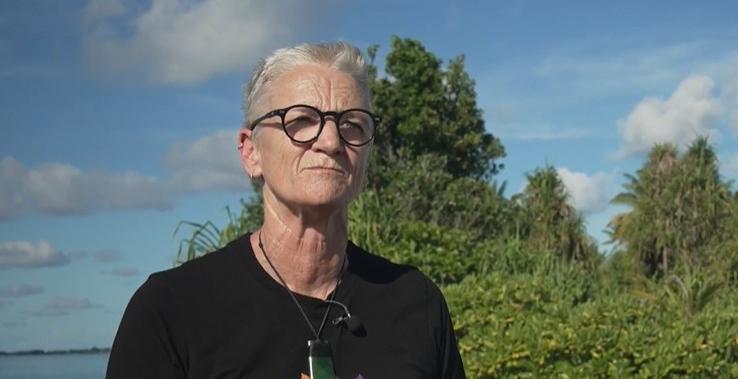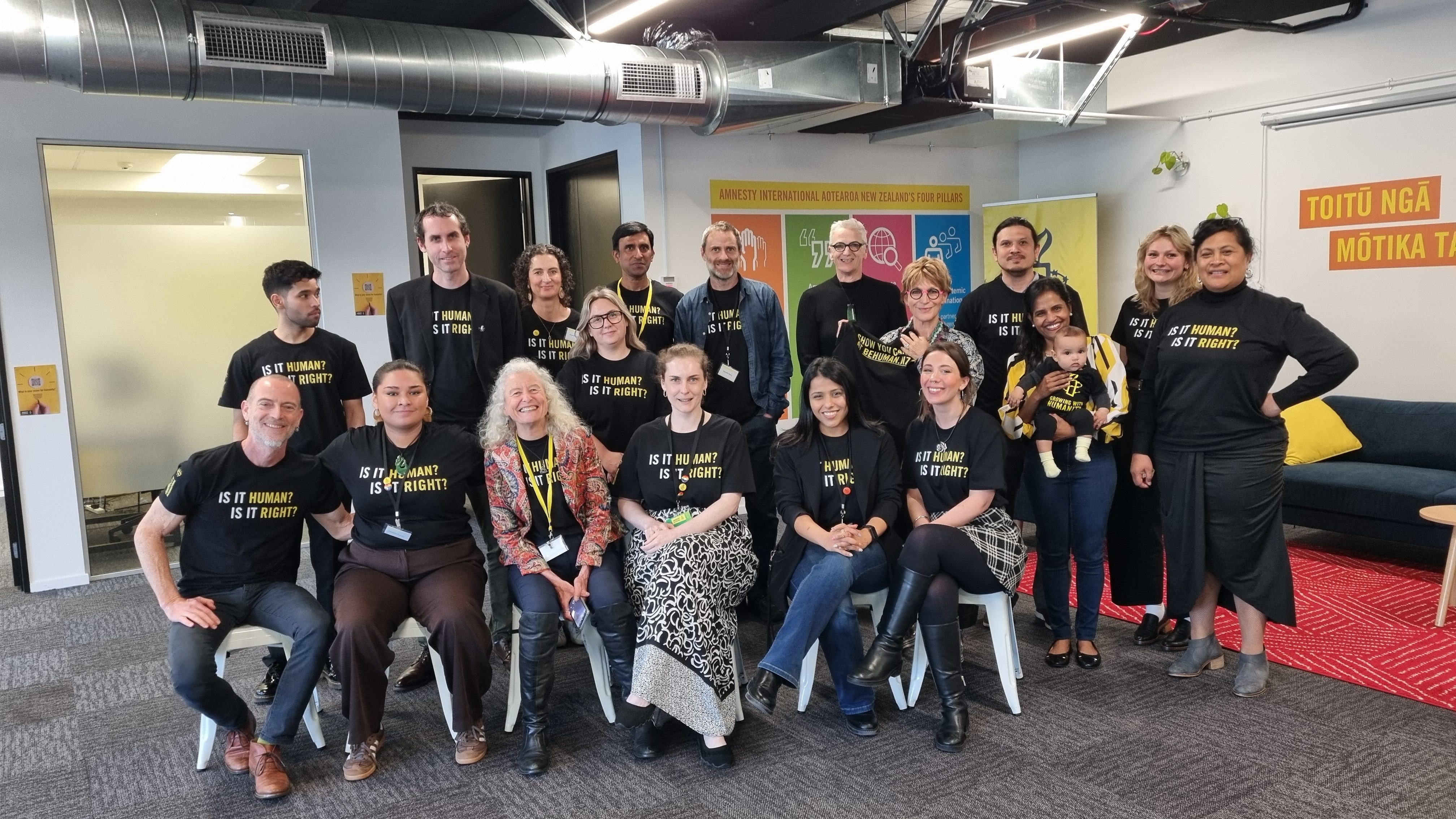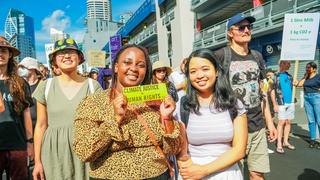A DUTY OF CARE AND A TEST OF OUR HUMANITY
Climate Displacement in the Pacific

by Jacqui Dillon, AIANZ Executive Director
In early October 2025, I had the privilege of travelling to Tuvalu with Dr. Agnès Callamard, the Secretary General of Amnesty International, along with two Amnesty International researchers who supported our local team in delivering Amnesty’s first climate report from the region: ’Navigating Injustice: Climate Displacement in the Pacific’.
For those who are not aware, Tuvalu is not only one of the least visited places on the planet but is in an unenviable position at the forefront of the climate crisis. Climate change poses an existential threat to Tuvalu due to its low-lying geography, with rising sea levels causing floods, saltwater intrusion and erosion, jeopardising fresh water and food supplies.
After having held fruitful meetings with leading human rights organisations in Suva, Fiji, on16 October we embarked on the remaining journey to Tuvalu. Our purpose: to honour and acknowledge those who generously, and sometimes courageously, contributed their voices to the report. The willingness to trust us with their collective histories, and their struggles and determined hopes for the future of Tuvalu, lends human voice to climate impact.
You might ask, “Why is Amnesty involved in climate – isn’t that straying from human rights?”
Nothing could be further from true. Human rights have always and will always remain our core reason for being. But as humans we do not exist in a vacuum, separated from our environment. Thus, climate change and its devastating impact is not only an environmental issue but a human rights emergency – and in Tuvalu it’s impossible not to see.
The flight from Fiji to Funafuti on a clear morning offers up three hours of breath-taking beauty. Looking out the window, small specks of islands and atolls are scattered across an indescribably vast ocean. Witnessing the beauty from above, one could be forgiven for thinking that these islands and atolls remain untouched and out of harm’s way. Yet landing in Funafuti, a different experience emerges. A siren sounds from below to signal our aircraft approaching, and in doing so, temporarily halts scooter traffic, which at all other hours of the day forms an orderly, somewhat noisy, flow across the main (and only) runway. This single act not only transforms the main road into a traffic jam, and pauses the makeshift volleyball and soccer games taking place on the runway (which in between flights doubles as the island’s only sports ground) but also prompts an excited gathering of locals eagerly awaiting guests.
On disembarking I am struck by the heat – at 32 degrees, it’s both humid and oppressive. At the same time, when it’s not raining, the surrounds can be quite arid. A tired yet somewhat beautiful colonial façade of the Bank of Tuvalu stands opposite the airport, next to simple but well presented homes. There are minimal fences between tidy sections, the town is punctuated by palm trees, a local equivalent of nikau, and numerous roadside plants compete to grow in this harsh environment. The lack of vegetable gardens (not due to local lack of trying), flowers or tropical plants are at odds with the picture postcard vision of the Pacific we, as New Zealanders, have traditionally subscribed too!
Scooters procured, we set off to discover the island – a beautiful ribbon-shaped thread consisting of coral ‘beaches’ – harbour on one side, and coral shelf with deep drop off into a vast ocean on the other. The roads are narrow and few – a single main road forms a spine from one end of Funafuti to the other. Travelling the length of the island takes less than 30 minutes, not accounting for segues into conversation with friendly community members, and pauses to allow space for local dogs, pigs and chickens to meander by. Infrastructure is tired, having been continuously subjected to the whims of the climate. Potholes abound. Roadsides are scarred with household objects and flotsam delivered and dropped unceremoniously by the last king tide or storm.
The loss of the physical and the historical is undoubtedly painful, both emotionally and culturally. Yet the loss threatens to go beyond this, trampling on basic, day to day human rights. The result is the rapid compromission of that which should be protected:
- Right to health: Extreme weather, flooding and salinisation damage infrastructure, contaminate water and affect food supplies, leading to a decline in health, especially for older persons and those with disabilities.
- Right to food and water: Coastal erosion, droughts and salinisation from sea-level rise make it difficult to grow food and access clean drinking water. This leads to increased reliance on expensive, imported food, as seen also in neighbouring Kiribati.
- Right to housing: Rising sea levels and king tides cause regular flooding, destroying homes and forcing people to move inland or to more vulnerable locations.
- Right to an adequate standard of living: The impacts of climate change threaten the ability of Tuvaluans to live with dignity, leading to displacement and creating a need for migration.
You might ask, how does this play out in the day to day lives of local people? Through a series of interconnected yet unintended consequences.

During the four days we transversed the island on both scooter and foot it became evident to me that it is not just household objects and possessions that are displaced through the impact of climate change. Further, it is not only the roadside that is scarred. The people of Tuvalu too suffer a similar indignity. Many locals we met have experienced and continue to be at risk of being forced from their homes, their livelihoods are compromised, they struggle to obtain fresh water and food, and they are at risk of losing both their histories and their futures.
Alongside community members courageously fighting for their collective future, we had the great privilege of meeting with the Prime Minister, Hon Feleti Penitala Teo, who shared with us the nation’s collective desire for pathways and the right to choose a future for this generation and future generations. We also met with Hon. Maina Talia, the Minister of Home Affairs, Climate Change, and Environment, directly off of his flight from Aotearoa New Zealand, where he was attending a conference. He similarly echoed the deep desire of people for choice – for the right to choose their future contributions and their homes, be that in Tuvalu or abroad in Aotearoa New Zealand. What was undeniable is the deep relationship between our nations.
Riding towards the northern end of Funafuti, we happened across local cemeteries, where the well-tended headstones and tombs of ancestors are teetering on the edge of the ocean. We stood silently, heads shaking in despair, within the ruins of what were once much-loved family homes, taken by the tides, stripped bare – the remains of what were once spaces and places of safety and belonging.
Every day, from early dawn to dusk, scooters and cars line up for fresh water from a single outdoor tap, an opportunity to fill a bucket and quench the family’s thirst – for that day at least, whilst the public reservoir remains full. Many mothers described their daily struggle to access water for drinking, let alone a sustainable clean source of water for cooking, bathing and cleaning.
Three days a week, fresh vegetables are available from the market garden near the centre of town – three vegetable choices per household. Which is fine if you live alone but insufficient if you live as many do, communally. Yes, you can get very limited fruit and vegetables from the local “supermarket”, but AUD$2.50 for one chilled kiwifruit well past its best-by date makes this option well out of reach for many families. And if because of a storm, or for whatever reason the supply ship doesn’t arrive, the shelves go bare.
What about fresh meat/fish? Traditional, sustainable fishing incomes are also now at risk due to the unintended consequences of poor effluent treatment and the impact of climate mitigation works on the Funafuti harbourside. Whilst these works are undoubtedly helpful to build protection against flooding and do indeed provide a novel space/place for local children to expel some energy in play, the impact of constructing them by ocean floor dredging has caused harm to the marine population.
A local fisherman tells me that whereas once he could fish on the harbour, he now needs to travel in his small tin boat for 37 nautical miles (68.5 kilometres) to make a catch his family’s survival depends on. What was once affordable and took a couple of hours now takes upwards of four hours and requires not only the high cost of fuel but also the risk of drowning due to a lack of life jackets or other safety aids. And his boat frankly was not built for open ocean fishing. Many expressed their heartbreak at the multiple local fisherman who have recently been assumed to have died at sea, their historical maritime skillsets no match for the open ocean conditions forced upon their communities.
These same people, with determination and willingness to adapt to the changing climate, responded with generosity and laughter towards me as a New Zealander. They shared stories of their own experiences and those of children, cousins, sisters, brothers and friends, who have a shared history with Aotearoa New Zealand that spans decades.
I felt ashamed that at a time when a new need – an urgent need – for protection, refuge and dignity is at the forefront of everyday life in Tuvalu, the current New Zealand Government policies fall short of offering realistic and humane pathways for anyone in Tuvalu, or other climate-affected Pacific communities, seeking safety in Aotearoa New Zealand.
Unsettling as it is, I have been privileged to see first-hand the existential crisis Pacific Islanders face as climate change accelerates displacement, threatening the homes, cultures and futures of communities.
I remain proud that Amnesty International Aotearoa New Zealand has called on the New Zealand Government and all New Zealanders to recognise this urgent humanitarian challenge. We will continue to make that call for New Zealand to uphold its moral and legal duties by providing safe and accessible pathways for those forced to flee rising seas and disasters.
But I am also frustrated and angry!
It is undeniable that Pacific Islanders have long been integral to Aotearoa New Zealand’s social fabric and economy. Generations of migrants have contributed enormously –powerfully shaping our communities, enriching our culture and sustaining critical sectors such as health, education and trade. Having visited Funafuti and witnessed first-hand a range of devastating climate impacts, I am adamant that Aotearoa has a debt of gratitude and that it must inform our response to people, families and communities affected by climate displacement.
As demonstrated through the stories of those I met, our country has strong ties with the Pacific. It is these historically strong ties with our cousins and neighbours that surely should demand that Aotearoa leads with compassion and responsibility. We must expand and adapt existing immigration and humanitarian frameworks to recognise climate displacement explicitly. This includes creating dedicated humanitarian visa pathways that are fit for purpose, as well as ensuring culturally appropriate support services.
Moreover, climate justice requires acknowledging the disproportionate burden the Pacific Islands bear from global emissions, to which they contributed least. New Zealanders must understand that supporting Pacific Islanders displaced by climate change is not charity – it is an obligation rooted in shared history and the principles of equity and solidarity. To ignore this obligation is neither human nor right.
For these reasons, Amnesty International Aotearoa New Zealand must, and will, continue to urge our government to act urgently and decisively to:
- Establish clear, dedicated humanitarian visas for climate-displaced Pacific peoples.
- Increase resettlement spaces proportional to displacement impacts across the region.
- Invest in community-led partnerships that support displaced Pacific Islanders’ rights, language and cultural preservation.
- Engage meaningfully with Pacific governments and civil society to co-develop just, sustainable solutions.
For the people of Tuvalu, their relationships with New Zealanders and with Aotearoa New Zealand as a whole, represents not just a shared cultural and economic history, but rather the possibility of hope for a future in the face of climate change. Conversely, for Aotearoa New Zealand, answering the call on climate displacement in the Pacific is a test of our humanity and a commitment to regional leadership. We owe Pacific Islanders more than words; we owe them a safe future.
It is time to match our enduring friendship with bold action. It is my hope, and it is Amnesty International Aotearoa New Zealand’s plea that together, as New Zealanders, we can stand with the Pacific in solidarity, offering refuge, respect, and renewed hope to those displaced by the climate crisis in the islands we call our region and home.
Why? Because it is human and it is right.



